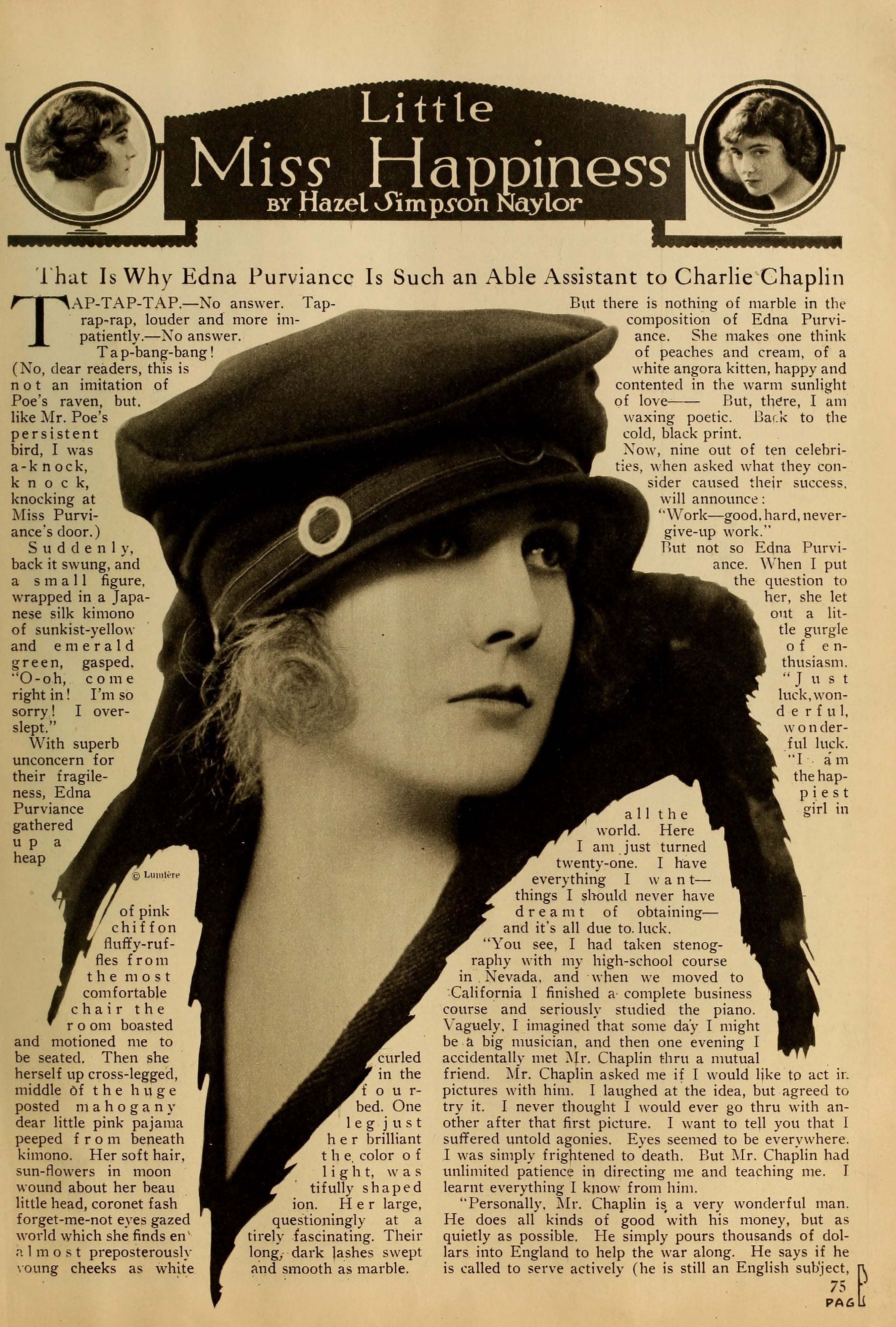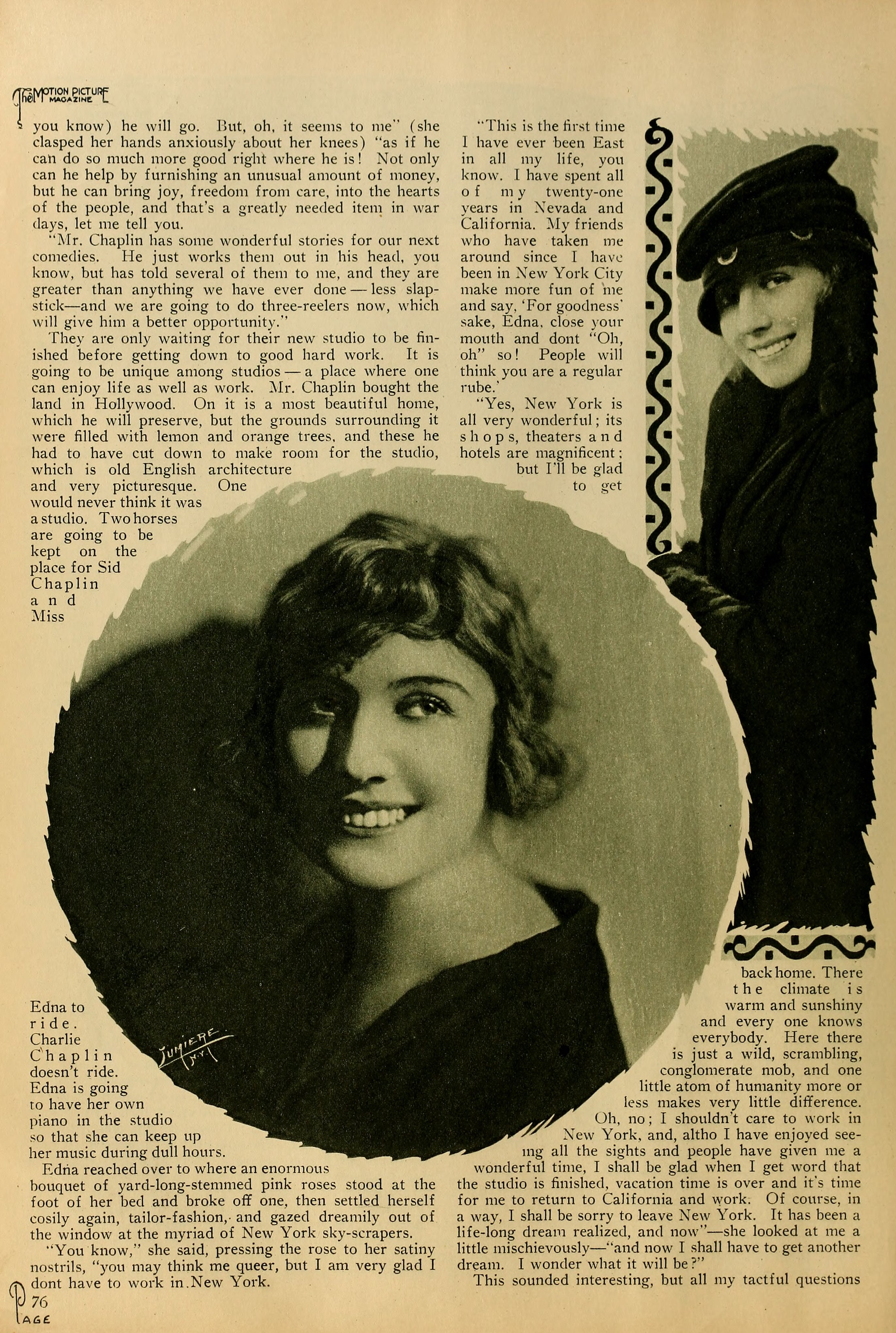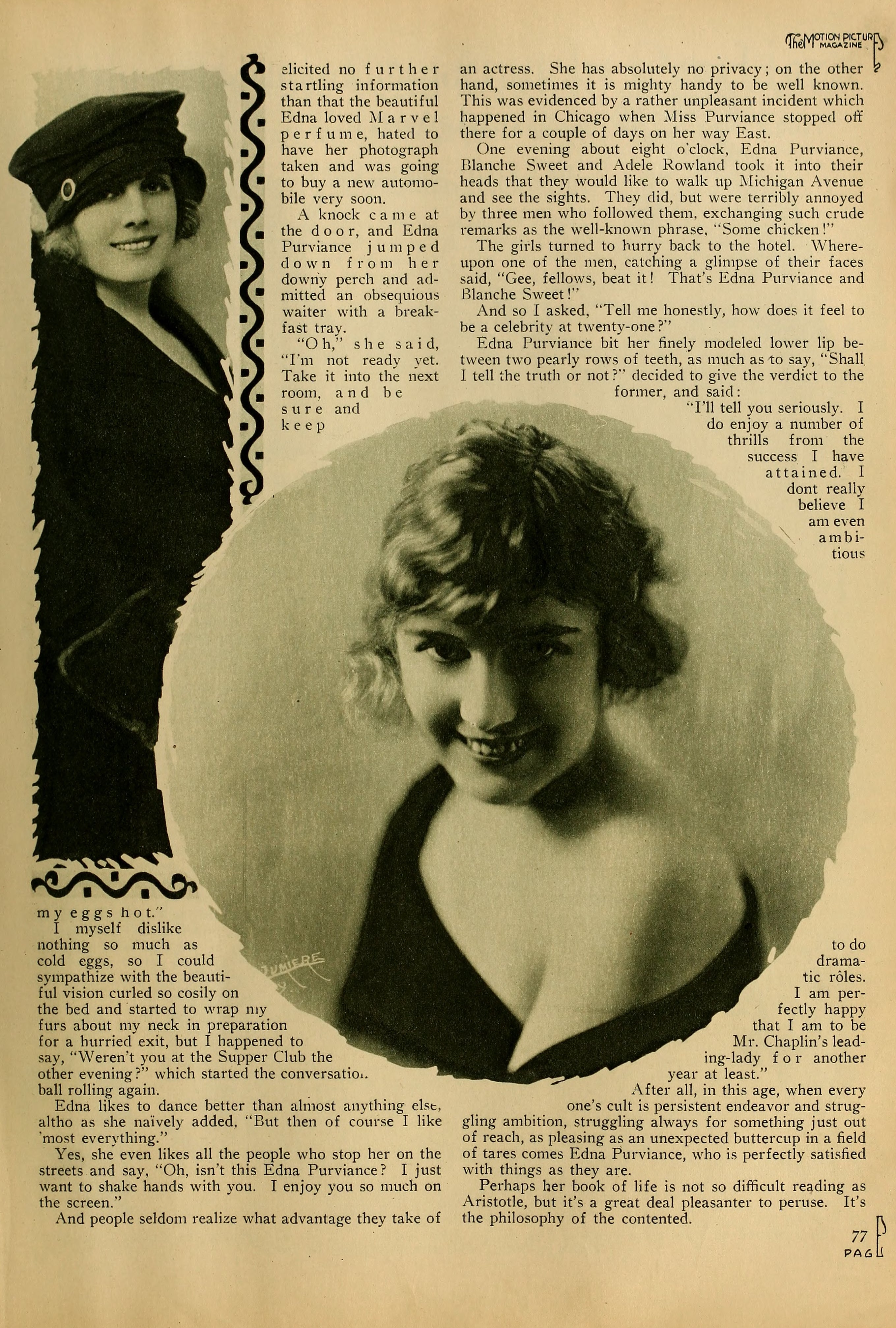Edna Purviance — Little Miss Happiness (1918) 🇺🇸
TAP-TAP-TAP. — No answer. Tap rap-rap, louder and more impatiently. — No answer. Tap-bang-bang! (No, dear readers, this is not an imitation of Poe’s raven, but like Mr. Poe’s persistent bird, I was a-knock, knock, knocking at Miss Purviance’s door.)
by Hazel Simpson Naylor
Suddenly, back it swung, and a small figure, wrapped in a Japanese silk kimono of sunkist-yellow and emerald green, gasped. “O-oh, come right in! I’m so sorry! I over-slept.”
With superb unconcern for their fragileness, Edna Purviance gathered up a heap of pink chiffon fluffy-ruffles from the most comfortable chair the room boasted and motioned me to be seated. Then curled she herself up cross-legged, in the middle of the huge four-posted mahogany bed. One dear little pink pajama leg just peeped from beneath her brilliant kimono. Her soft hair, the color of sun-flowers in moonlight, was wound about her beautifully shaped little head, coronet fashion. Her large, forget-me-not eyes gazed questioningly at a world which she finds entirely fascinating. Their almost preposterously long, dark lashes swept young cheeks as white and smooth as marble.
But there is nothing of marble in the composition of Edna Purviance. She makes one think of peaches and cream, of a white angora kitten, happy and contented in the warm sunlight of love — But, there, I am waxing poetic. Back to the cold, black print.
Now, nine out of ten celebrities, when asked what they consider caused their success, will announce: ‘‘Work — good, hard, never-give-up work.”
But not so Edna Purviance. When I put the question to her, she let out a little gurgle of enthusiasm. “Just luck, wonderful, wonderful luck. “I am the happiest girl in all the world. Here I am just turned twenty-one. I have everything I want — things I should never have dreamt of obtaining — and it’s all due to luck. You see, I had taken stenography with my high-school course in Nevada, and when we moved to California I finished a complete business course and seriously studied the piano. Vaguely. I imagined that some day I might be a big musician, and then one evening I accidentally met Mr. Chaplin thru a mutual friend. Mr. Chaplin asked me if I would like to act in pictures with him. I laughed at the idea, but agreed to try it. I never thought I would ever go thru with another after that first picture. I want to tell you that I suffered untold agonies. Eyes seemed to be everywhere. I was simply frightened to death. But Mr. Chaplin had unlimited patience in directing me and teaching me. I learnt everything I know from him.
“Personally, Mr. Chaplin is a very wonderful man. He does all kinds of good with his money, but as quietly as possible. He simply pours thousands of dollars into England to help the war along. He says if he is called to serve actively (he is still an English subject, you know) he will go. But, oh, it seems to me” (she clasped her hands anxiously about her knees) “as if he can do so much more good right where he is! Not only can he help by furnishing an unusual amount of money, but he can bring joy, freedom from care, into the hearts of the people, and that’s a greatly needed item in war days, let me tell you.
“Mr. Chaplin has some wonderful stories for our next comedies. He just works them out in his head, you know, but has told several of them to me, and they are greater than anything we have ever done — less slapstick — and we are going to do three-reelers now, which will give him a better opportunity.”
They are only waiting for their new studio to be finished before getting down to good hard work. It is going to be unique among studios — a place where one can enjoy life as well as work. Mr. Chaplin bought the land in Hollywood. On it is a most beautiful home, which he will preserve, but the grounds surrounding it were filled with lemon and orange trees, and these he had to have cut down to make room for the studio, which is old English architecture and very picturesque. One would never think it was a studio. Two horses are going to be kept on the place for Sid Chaplin and Miss Edna to ride. Charlie Chaplin doesn’t ride. Edna is going to have her own piano in the studio so that she can keep up her music during dull hours. Edna reached over to where an enormous bouquet of yard-long-stemmed pink roses stood at the foot of her bed and broke off one, then settled herself cosily again, tailor-fashion, and gazed dreamily out of the window at the myriad of New York sky-scrapers.
“You know,” she said, pressing the rose to her satiny nostrils, “you may think me queer, but I am very glad I don’t have to work in New York.
“This is the first time I have ever been East in all my life, you know. I have spent all of my twenty-one years in Nevada and California. My friends who have taken me around since I have been in New York City make more fun of me and say, ‘For goodness’ sake, Edna, close your mouth and don’t “Oh, oh” so! People will think you are a regular rube.’
“Yes, New York is all very wonderful; its shops, theaters and hotels are magnificent; but I’ll be glad to get back home. There the climate is warm and sunshiny and every one knows everybody. Here there is just a wild, scrambling, conglomerate mob, and one little atom of humanity more or less makes very little difference. Oh, no; I shouldn’t care to work in New York, and, altho I have enjoyed seeing all the sights and people have given me a wonderful time, I shall be glad when I get word that the studio is finished, vacation time is over and it’s time for me to return to California and work. Of course, in a way, I shall be sorry to leave New York. It has been a life-long dream realized, and now” — she looked at me a little mischievously — “and now I shall have to get another dream. I wonder what it will be?”
This sounded interesting, but all my tactful questions elicited no further startling information than that the beautiful Edna loved Marvel perfume, hated to have her photograph taken and was going to buy a new automobile very soon.
A knock came at the door, and Edna Purviance jumped down from her downy perch and admitted an obsequious waiter with a breakfast tray.
“Oh,” she said, “I’m not ready yet. Take it into the next room, and be sure and keep my eggs hot.”
I myself dislike nothing so much as cold eggs, so I could sympathize with the beautiful vision curled so cosily on the bed and started to wrap my furs about my neck in preparation for a hurried exit, but I happened to say, “Weren’t you at the Supper Club the other evening?” which started the conversation ball rolling again.
Edna likes to dance better than almost anything else, altho as she naively added, “But then of course I like ‘most everything.”
Yes, she even likes all the people who stop her on the streets and say, “Oh, isn’t this Edna Purviance? I just want to shake hands with you. I enjoy you so much on the screen.”
And people seldom realize what advantage they take of an actress. She has absolutely no privacy; on the other hand, sometimes it is mighty handy to be well known. This was evidenced by a rather unpleasant incident which happened in Chicago when Miss Purviance stopped off there for a couple of days on her way East.
One evening about eight o’clock, Edna Purviance, Blanche Sweet and Adele Rowland took it into their heads that they would like to walk up Michigan Avenue and see the sights. They did, but were terribly annoyed by three men who followed them, exchanging such crude remarks as the well-known phrase, “Some chicken!”
The girls turned to hurry back to the hotel. Whereupon one of the men, catching a glimpse of their faces said, “Gee, fellows, beat it! That’s Edna Purviance and Blanche Sweet!”
And so I asked, “Tell me honestly, how does it feel to be a celebrity at twenty-one?”
Edna Purviance bit her finely modeled lower lip between two pearly rows of teeth, as much as to say, “Shall I tell the truth or not?” decided to give the verdict to the former, and said:
“I’ll tell you seriously. I do enjoy a number of thrills from the success I have attained. I don’t really believe I am even ambitious to do dramatic roles. I am perfectly happy that I am to be Mr. Chaplin’s leading-lady for another year at least.”
After all, in this age, when every one’s cult is persistent endeavor and struggling ambition, struggling always for something just out of reach, as pleasing as an unexpected buttercup in a field of tares comes Edna Purviance, who is perfectly satisfied with things as they are.
Perhaps her book of life is not so difficult reading as Aristotle, but it’s a great deal pleasanter to peruse. It’s the philosophy of the contented.

© Lumière


Collection: Motion Picture Magazine, April 1918
---
see also
